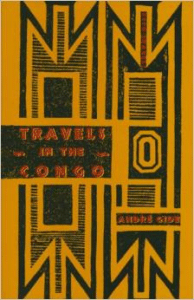 A Non-Emotional Version of Daily, Small History in French Colonial Africa
A Non-Emotional Version of Daily, Small History in French Colonial Africa
Author: Andre Gide
Travels in the Congo is a classic, albeit obscure, memoir detailing André Gide’s travels from July 1926 through to May 1927 in French Equatorial Africa (currently the Republic of the Congo, the Central African Republic, Chad, and Cameroon.) Gide travels with his lover, Marc Allégret, who creates a film from their adventures also known as Travels in the Congo. Interestingly, the most historically scandalous aspect off Gide’s life, later friends with Oscar Wilde who believes that he introduces the man to homosexuality, are only faintly detectable in the book, although the author’s description of the male Congolese is enough to make one question. According to history, this is around the time that Gide embraces his love of men (although, really, can anything truly be known about the human soul?) Later, Gide does become known for his strong opinions against colonialism, the French government, communism (after a visit to the USSR), and homosexuality, which he openly admits in 1927. This memoir, however, sticks to the dry accounting of emotionless facts and laborious descriptions of unnamed plants and enough footnotes to terrify even the most hardened of academics. Gide himself, although this is his memoir, does not come through and although he recognizes the horrible abuses against the Congolese and the horrific way in which black people were viewed and treated at the time, he is still a product of his times and not yet ready to completely distance and smash colonialism. Likewise, he still has the irritating tendency, although elevating and praising the native inhabitants, of making them into simplistic “others” who are still somehow inferior if not evil, as his contemporaries felt.
Travels in the Congo is an intimidating, oversized paperback of over 400 hundred tightly packaged pages of type. While I commend the author for making the baby steps to break away from his times and to show the abuses and neglect, trying in his own small way to make things better, he still doesn’t fully “get it” although I suppose a sudden epiphany would be too much to expect, although we can see the evolution of the author.
Mostly, however, the book is like any diary: nothing special, nothing interesting, and a lot of repetition. I’ve had a strong yen for the Congo since my first memory, probably brought on by the Nature shows that consumed my youth, and have been known to find travel guides of the Congo pretty gripping stuff. I’m actually working on a fictional novel set in the current Democratic Republic of the Congo (previously Zaire) and fell into this particular work as part of my head long research – a guilty little hobby that bores my friends and family. I tend to steam through at least two books a week – so when it took me several months to read this book, I suspected that despite its historical importance and the corner stone of rebellion that would mark Gide more prominently later in his life, especially in his return to Chad memoir and his writings on the USSR, nothing stands out in this enormous, rambling, mostly extraneous collection of tediously torpid entries. And I spend my free time day dreaming about going on exactly the same trip – and I found it hard to stay awake.
Firstly, while the landscape is prominent, as is the flora and fauna, and the native animals (which they go after like Monty Python’s shooting party), the author spends a lot of time complaining about how it doesn’t look like France or various other “civilized” places. He complains about the place, the geography, the climate, etc, making readers wonder why he ever decided to go – unless to repeatedly miss shooting some poor animal.
The writing is detached, not personal, unemotional. He goes from relating a terrible death in the river to speaking about whatever book he is reading at the time, as though the events are of equal importance, and it feels like an academic foray that misses the real world. While I appreciate the author’s blooming horror at the fate of the Congolese, there are other historical novels that explore this angle more completely, instead of excesses suspected and seen at just the periphery. Overall, Travels in the Congo is a very eclectic read, designed only for heavy historical researchers or people immersed in all things pertaining to the history of the Congo. Even then, there are books that approach this topic more thoroughly and with less rambling. I appreciate what Gide is starting to stand up for here, but it’s not enough to redeem this particular offering. Not recommended.
- Frances Carden
- Book Vs Movie: The Shining - April 6, 2020
- Thankful For Great Cozy Mysteries - December 13, 2019
- Cozy Mysteries for a Perfect Fall - October 20, 2019

Leave A Comment